General Science Daily Online Free Practice Quiz For seventeenth July 2020

This discovering is broadly in keeping with a 2016 report that shows that more Americans perceive the news they get online from news organizations to be accurate than say the same of people they are shut with online. But basic outletshttps://www.shanelgkennels.com by a longshothttps://www.shanelgkennels.com are not considered probably the most accurate – that distinction goes to specialty sourceshttps://www.shanelgkennels.com particularly documentarieshttps://www.shanelgkennels.com science magazineshttps://www.shanelgkennels.com and science and know-how museums. Fewer Americans regularly depend on these specialty sources for science newshttps://www.shanelgkennels.com but roughly half of Americans assume that each of those three specialty sources get the facts proper about science more often than not.
More than seven-in-ten energetic science news consumers say science and expertise museums (seventy four{373ef3030c12d1bfb606757904bd0b23869624e49aa3cbb849a44e3d15efee00})https://www.shanelgkennels.com science documentaries (seventy three{373ef3030c12d1bfb606757904bd0b23869624e49aa3cbb849a44e3d15efee00}) and science magazines (seventy two{373ef3030c12d1bfb606757904bd0b23869624e49aa3cbb849a44e3d15efee00}) get the details right most of the time. In distinctionhttps://www.shanelgkennels.com minorities of uninterested science news shoppers think every of those sources is accurate greater than half the time. Andhttps://www.shanelgkennels.com simply sixteen{373ef3030c12d1bfb606757904bd0b23869624e49aa3cbb849a44e3d15efee00} of Americans perceive their family and pals to be accurate sources of science informationhttps://www.shanelgkennels.com far fewer than say common information shops and most specialty sources get the facts right about science information most of the time.
Coronavirus News Rounduphttps://www.shanelgkennels.com July 11-july 17
NewScientist and Live …

